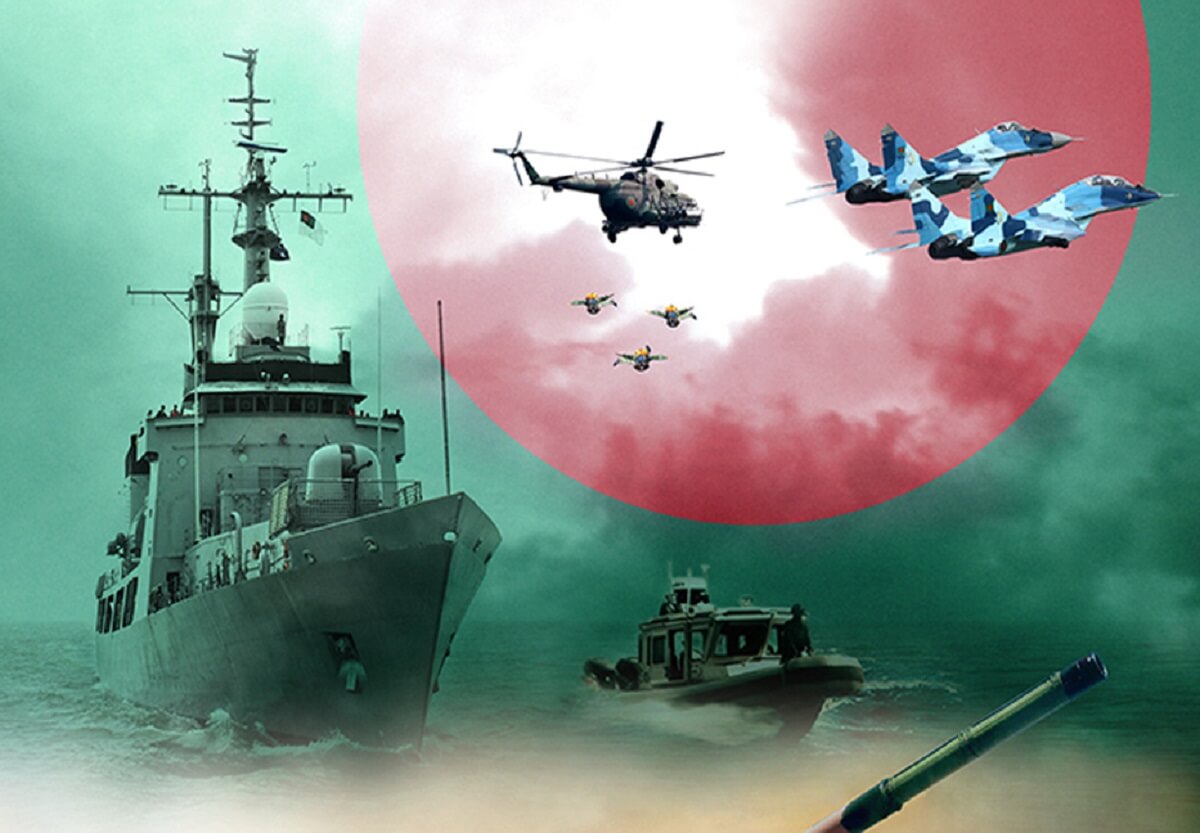Bangladesh Should Revisit the Forces Goal 2030
Julian Rafah | 24 July 2024
On 5 August 2024, Bangladesh witnessed a historic revolution led by students and the masses. However, it came at a heavy price, with thousands losing their lives. This revolution mandates that the government reassess the previous regime’s defence policies, which, even to the casual observer, appear weak, unclear, and inclined to appease external actors—far from what Bangladesh truly needs.
From a geostrategic perspective, Bangladesh is located at the crossroads between Southeast and South Asia via the Bay of Bengal, with India surrounding it on three sides and Myanmar on the other. Despite being bordered by India on three sides, Bangladesh is not landlocked like Bhutan or Nepal. It has deep-sea ports and access to the Bay of Bengal. Therefore, Bangladesh's ability to shape its defence policies without external interference is neither limited nor constrained.
Bangladesh was once referred to as a ‘defender’s paradise’, particularly during the 1971 war, due to its unique terrain, which became especially formidable during the monsoon. However, the country lacks ‘strategic depth’, meaning that its capital city, port city, and military infrastructure are not far from enemy frontlines. The only comparable country is Singapore, which addressed this issue by building one of Asia’s strongest air forces. Singapore operates state-of-the-art fighter aircraft and attack helicopters to defend its skies, relying on Western-origin multirole combat aircraft and advanced air defence capabilities. Bangladesh should adopt similar strategies in its Forces Goal, which currently lacks such foresight.
During the first UK-Bangladesh Defence Dialogue, the Bangladeshi delegation expressed interest in purchasing 16 multirole combat aircraft (MRCA), state-of-the-art air defence sensors, and other systems from the UK. In 2021, Eurofighter World Magazine named Bangladesh as a potential customer for the Eurofighter Typhoon, but the process was halted for unknown reasons. Bangladesh should seriously consider acquiring this combat aircraft, as it would greatly enhance its air defence capabilities, and it should avoid opting for French Rafales or other variants used by potential adversaries.
In 2020, Bangladesh shortlisted the Apache AH-64E attack helicopter, but it has yet to procure any. Bangladesh urgently needs to sign two agreements—the Acquisition and Cross-Servicing Agreement (ACSA) and the General Security of Military Information Agreement (GSOMIA)—with the USA to facilitate the purchase of advanced military technologies. Acquiring Apache helicopters would significantly boost Bangladesh’s air defence capabilities, particularly in the Chittagong Hill Tracts, where they could be used to counter terrorist activities. While Western equipment may be more expensive than other options, it is more sustainable and aligns with the requirements of the Bangladesh Air Force. Crucially, a strong military enables a state to protect its national interests and effectively pursue its foreign policy objectives.
Nevertheless, Bangladesh should diversify its sources for military hardware, ensuring that it acquires high-quality, efficient equipment from countries such as Germany, Italy, China, Pakistan, Türkiye, South Korea, and Japan. In the event of a conflict with a major power, Bangladesh would likely face asymmetric warfare. In such a scenario, unconventional and hybrid warfare tactics would be essential. Bangladesh also lacks adequate ‘defence diplomacy’, a crucial element of 21st-century statecraft. More research institutions focusing on foreign policy and security should be established to address this, drawing on the expertise of young talent, military officials, and security professionals.
Another major shortcoming in Bangladesh’s security apparatus is the absence of an effective intelligence agency. While the Directorate General of Forces Intelligence (DGFI) exists, it is limited to military personnel. Bangladesh needs an intelligence agency of international calibre, akin to the CIA, MI6, ISI, or RAW, that recruits talented young minds, security experts, and foreign policy professionals, who would then be trained to conduct espionage both domestically and internationally. Establishing such an agency should be a priority, as a robust intelligence service can neutralise threats from hostile states before they can strike.
Therefore, the Government of Bangladesh must revisit its Forces Goal 2030, as it is intrinsically linked to the nation’s security and existence. The government must prioritise modernising the Bangladesh Air Force and Navy, bearing in mind the fierce regional competition for dominance in the Bay of Bengal. Additionally, a strong intelligence agency should be created to counter external threats, and the army should be modernised with tanks and artillery, emphasising air defence. Transparency in military expenditure must be ensured, and the military should focus on enhancing its firepower rather than just expanding infrastructure, as Bangladesh is surrounded by hostile nation.
Julian Rafah is a final-year Law student at the University of Dhaka, a former intern at the Centre for Governance Studies (CGS), and an official contributor to The Daily Star’s Law & Our Rights. He is interested in geopolitics, security, and global affairs.
Views in this article are author’s own and do not necessarily reflect CGS policy.
